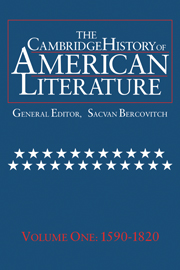Book contents
- Frontmatter
- Introduction
- THE LITERATURE OF COLONIZATION
- 1 The Papers of Empire
- 2 The Natural Inhabitants
- 3 Three Writers of Early America
- 4 Settlements
- 5 The Dispute of the New World
- 6 Traveling in America
- 7 The Final Voyage
- NEW ENGLAND PURITAN LITERATURE
- BRITISH-AMERICAN BELLES LETTRES
- THE AMERICAN ENLIGHTENMENT, 1750–1820
- THE LITERATURE OF THE REVOLUTIONARY AND EARLY NATIONAL PERIODS
- Chronology
- Bibliography
- Index
6 - Traveling in America
from THE LITERATURE OF COLONIZATION
Published online by Cambridge University Press: 28 March 2008
- Frontmatter
- Introduction
- THE LITERATURE OF COLONIZATION
- 1 The Papers of Empire
- 2 The Natural Inhabitants
- 3 Three Writers of Early America
- 4 Settlements
- 5 The Dispute of the New World
- 6 Traveling in America
- 7 The Final Voyage
- NEW ENGLAND PURITAN LITERATURE
- BRITISH-AMERICAN BELLES LETTRES
- THE AMERICAN ENLIGHTENMENT, 1750–1820
- THE LITERATURE OF THE REVOLUTIONARY AND EARLY NATIONAL PERIODS
- Chronology
- Bibliography
- Index
Summary
Toward the end of the eighteenth century and the beginning of the nineteenth, during the period when the English colonies declared themselves a nation, the enterprise of coming to the New World and exploring it changed decisively. From a perilous journey into the unknown, it became the civilized pursuit of traveling in America. In 1796, Timothy Dwight (1764–1846), finding the life of a president of Yale College too sedentary, decided “to devote [his] vacations … to a regular course of traveling”. During the second of these salubrious journeys, it occurred to him while surveying the orderly countryside to wonder how these New England landscapes had appeared eighty or even a hundred years earlier. But he found the past impossible to recall, so swift had been the transformation. He resolved instead to capture the fleeting present and record it for those who would live eighty or a hundred years hence. “A country changing as rapidly as New England must, if truly exhibited, be described in a manner resembling that in which a painter would depict a cloud”, he wrote. It was an accurate rendition of a period of transition. Dwight traveled for his health and wrote about his travels as a literary pursuit – reflectively, speculatively, poetically, and for an undoubted posterity.
The grandson of Jonathan Edwards and himself a prominent minister, Dwight represents an already old New England. He recalls the persistence of Puritan values at the founding of the Republic. Commending the decent “competence” and measured way of life of his Connecticut neighbors, he disdains the excitements of the traditional travel narrative.
- Type
- Chapter
- Information
- The Cambridge History of American Literature , pp. 126 - 148Publisher: Cambridge University PressPrint publication year: 1994

